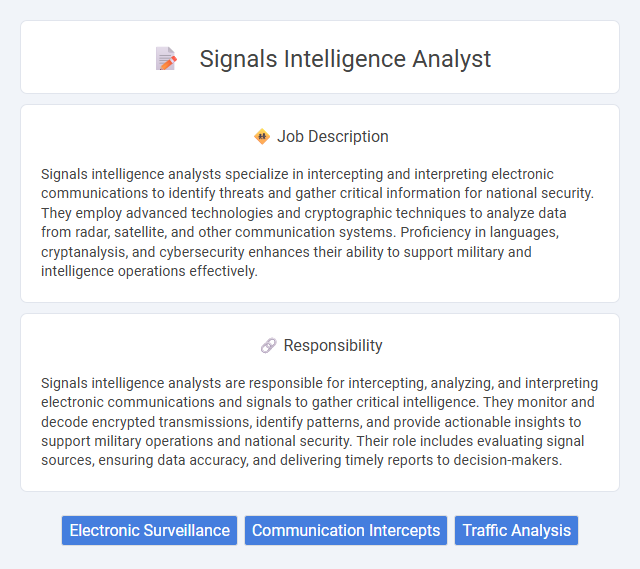
Signals intelligence analysts specialize in intercepting and interpreting electronic communications to identify threats and gather critical information for national security. They employ advanced technologies and cryptographic techniques to analyze data from radar, satellite, and other communication systems. Proficiency in languages, cryptanalysis, and cybersecurity enhances their ability to support military and intelligence operations effectively.
Individuals with strong analytical skills and a keen attention to detail are likely to thrive as Signals Intelligence analysts, given the job's demand for interpreting complex data patterns. Those with high levels of patience and the ability to work under pressure might find the role suitable due to the often sensitive and time-critical nature of intelligence work. People who struggle with confidentiality or multitasking may find this career less compatible with their strengths and personality.
Qualification
A Signals Intelligence Analyst must have a strong background in computer science, cybersecurity, or a related technical field, with expertise in signal processing and electronic communications. Proficiency in analyzing intercepted communications, cryptographic techniques, and understanding intelligence protocols is essential. Certification in security clearance and knowledge of military or government intelligence operations significantly enhance qualification prospects.
Responsibility
Signals intelligence analysts are responsible for intercepting, analyzing, and interpreting electronic communications and signals to gather critical intelligence. They monitor and decode encrypted transmissions, identify patterns, and provide actionable insights to support military operations and national security. Their role includes evaluating signal sources, ensuring data accuracy, and delivering timely reports to decision-makers.
Benefit
A Signals Intelligence Analyst job may offer significant benefits such as enhanced career growth opportunities due to high demand in national security and defense sectors. Employees in this role might receive access to cutting-edge technology and specialized training, which can improve technical skills and job marketability. There is also a probable chance of competitive salaries and comprehensive benefits packages, including security clearances that could open doors to future advanced positions.
Challenge
A Signals Intelligence Analyst likely faces complex challenges related to interpreting vast amounts of encrypted and fragmented data, requiring advanced analytical skills and attention to detail. The role probably demands adaptability to rapidly evolving technologies and threat landscapes, making continuous learning essential. Managing time-sensitive information while maintaining accuracy could be a frequent source of professional pressure.
Career Advancement
Signals intelligence analysts enhance national security by intercepting and analyzing electronic communications to identify threats. Career advancement often involves progressing to senior analyst roles, specializing in cyber intelligence, or transitioning into leadership positions within intelligence agencies. Mastery of advanced analytic tools and continuous security clearance updates are critical for upward mobility in this field.
Key Terms
Electronic Surveillance
Signals intelligence analysts specializing in electronic surveillance collect and interpret intercepted electronic communications to identify potential threats and gather critical intelligence. They utilize advanced technology and software to monitor, analyze, and decode signals from radar, communications systems, and other electronic emissions. Their expertise supports military operations, national security efforts, and counterterrorism by providing actionable intelligence derived from electronic signals.
Communication Intercepts
Signals intelligence analysts specialize in intercepting and analyzing communication signals to gather actionable intelligence for national security and defense operations. They employ advanced signal processing techniques and cryptographic tools to decode encrypted messages and identify patterns within intercepted transmissions. Expertise in communication protocols, electronic warfare, and real-time data analysis enables these analysts to provide critical insights for strategic decision-making.
Traffic Analysis
Signals intelligence analysts specializing in traffic analysis monitor and interpret communication patterns to identify and predict adversary intentions, movements, and organizational structures. They utilize advanced tools to collect, process, and evaluate signal traffic, enabling timely and accurate intelligence assessments. Their expertise supports military and national security operations by uncovering communication linkages and traffic flow within target networks.
 kuljobs.com
kuljobs.com